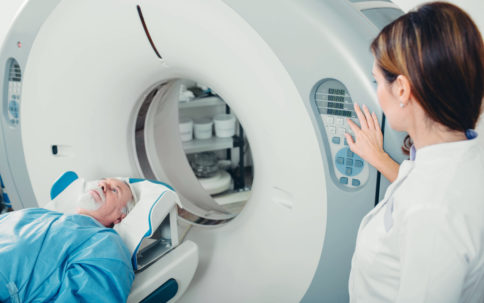Mesothelioma is often misdiagnosed due to its rarity and symptoms shared with more common illnesses. A misdiagnosis can lead to delayed treatment and lower life expectancy. Potential symptoms of mesothelioma warrant an accurate diagnosis from a specialist.
Can Mesothelioma Be Misdiagnosed?

Yes, mesothelioma can be misdiagnosed. A patient’s mesothelioma type and symptoms can play a part in a misdiagnosis.
Pleural mesothelioma, a type of cancer that forms in the lining of the lungs, presents multiple symptoms related to the lungs and respiratory system. For this reason, patients with this cancer may be misdiagnosed with another type of lung-related disease.
Symptoms of peritoneal mesothelioma cancer, which begins in the lining of the abdomen, largely affect the stomach and digestive system, causing some patients to be misdiagnosed with another abdominal illness.
What Can Cause a Mesothelioma Misdiagnosis?
Over 20% of mesothelioma cases are misdiagnosed. There are three primary reasons why a general doctor or oncologist may misdiagnose mesothelioma.
1. Mesothelioma Is Rare
Mesothelioma is a very rare type of cancer, so it isn’t something primary care doctors come into contact with on a regular basis. In turn, physicians don’t always think to check for it when patients report symptoms.
Number of Annual Diagnoses in the U.S.
Even if a doctor is able to identify mesothelioma right away, they can still make mistakes in the staging of the disease, which can lead to improper treatment. Getting a second opinion from an experienced mesothelioma doctor can help ensure a proper diagnosis and effective treatment plan.
2. Mesothelioma Has a Long Latency Period
Mesothelioma usually doesn’t develop until 10-50 years after initial exposure to asbestos (the only known cause of this cancer). This long gap between exposure and symptoms, called the latency period, can make it difficult to draw a connection between the two.
3. Mesothelioma Has Vague Symptoms
Mesothelioma symptoms may resemble those of more common diseases.
For example, the symptoms of pleural mesothelioma are often the same as or similar to the symptoms of pneumonia. For symptoms in the abdomen, like those that come with peritoneal mesothelioma, doctors may be more likely to suspect irritable bowel syndrome (IBS).
Getting a Second Opinion for Mesothelioma
After receiving a diagnosis, don’t hesitate to seek advice from another doctor who specializes in mesothelioma.
Getting a mesothelioma second opinion is important because:
- It provides peace of mind that a proper diagnosis was made.
- It could result in a different diagnosis with a more favorable outcome (prognosis).
- It could open up different treatment options (such as new medications being tested in clinical trials).
If you believe you may have been misdiagnosed, a second opinion from a specialized mesothelioma doctor can help ensure you get an accurate diagnosis and maximize your treatment options.
Use our Doctor Match program to get in touch with a doctor for a second opinion.
Pleural Mesothelioma Misdiagnosis
Pleural mesothelioma may be misdiagnosed as:
- Chronic obstructive pulmonary disease (COPD)
- Lung cancer
- Influenza
- Emphysema
- Pneumonia
- Other respiratory conditions
Not only can pleural mesothelioma be misdiagnosed as an entirely different cancer or illness, but its stages can also be misdiagnosed.
Common symptoms of pleural mesothelioma include shortness of breath, pain when breathing, a persistent dry and raspy cough, and fluid buildup in the lungs (pleural effusion).
These symptoms are shared with many other, more common respiratory conditions, making a pleural mesothelioma misdiagnosis a possibility for many patients.
Misdiagnosing Pleural Mesothelioma Stage
If a doctor misdiagnoses a pleural mesothelioma stage as more or less advanced than it really is, patients may not be able to receive the most effective mesothelioma treatment options.
For example, life-extending mesothelioma surgery is usually restricted to early-stage patients. An accurate stage diagnosis can mean the difference between a life expectancy of months or years.
Peritoneal Mesothelioma Misdiagnosis
Peritoneal mesothelioma may be misdiagnosed as:
- Ovarian cancer
- Hernia
- Gallstones
- Crohn's disease
- IBS
The symptoms of peritoneal mesothelioma include pain in the abdomen, swelling, and nausea — the same symptoms caused by ovarian cancer and other abdominal conditions.
“I went back to have another X-ray and another CT scan, and they also drew blood to make sure that it was [peritoneal] mesothelioma because they said it could be that, or I could have Crohn's disease.”
– Brenda W., Peritoneal Mesothelioma Patient
Mesothelioma Misdiagnosis of Rarer Types
Pericardial mesothelioma (cancer of the lining of the heart) and testicular mesothelioma (cancer of the lining of the testes) are two of the rarest forms of this cancer, with both types making up around 1% of all mesothelioma cases each year.
Their extreme rarity makes them even easier to misdiagnose than other mesothelioma types.
Pericardial Mesothelioma Misdiagnosis
Pericardial mesothelioma may be misdiagnosed as:
- Angiosarcoma
- Congestive heart failure
- Coronary artery disease
- Heart disease
- Late-stage lung cancer
Pericardial mesothelioma symptoms include chest pain, coughing, and difficulty breathing, which are often mistaken for other heart and lung issues. Most cases of pericardial mesothelioma are only properly diagnosed after surgery for the misdiagnosed disease or during an autopsy.
Testicular Mesothelioma Misdiagnosis
Testicular mesothelioma may be misdiagnosed as:
- Epididymitis
- Hernia
- Infection
- Physical trauma
- Testicular cyst
Testicular mesothelioma can present as swelling in the scrotum (hydrocele), which is often a mild condition rarely caused by cancer. For this reason, doctors may not think to test patients with this symptom for any kind of cancer.
Misdiagnosing Mesothelioma Cell Type
In addition to a misdiagnosis of mesothelioma type/location, doctors may also misdiagnose mesothelioma cell types, which are classified as epithelioid, sarcomatoid, or mixed/biphasic.
This misdiagnosis can influence a patient’s mesothelioma prognosis and treatment options.
Patients with epithelioid mesothelioma cells usually have the most treatment options, so a misdiagnosis could mean fewer curative treatment options.
Similarly, if a patient with sarcomatoid mesothelioma is wrongly diagnosed, they could be put through a rigorous treatment schedule that’s ineffective.
In the case of biphasic mesothelioma (combination of epithelial and sarcomatoid cells), pathologists may diagnose it as purely one cell type, or they may misdiagnose the ratio of cells.
Download our Free Doctor Checklist ahead of your next appointment to get the answers you need.
How to Get the Right Mesothelioma Diagnosis
You can lower your risk of a mesothelioma misdiagnosis by getting a second opinion from a mesothelioma specialist. These doctors possess a deep knowledge of mesothelioma symptoms, staging, and cell types that general oncologists may lack.
Visit a Mesothelioma Specialist
If you or your loved one has a history of asbestos exposure and is experiencing mesothelioma symptoms, it's important to get examined by a doctor who specializes in diagnosing mesothelioma.
Specialists can perform the appropriate diagnostic tests and look for small differences between mesothelioma and similar diseases.
Veterans can contact top mesothelioma specialists like Dr. Robert B. Cameron through the U.S. Department of Veterans Affairs (VA) Health Care System.
How Specialists Diagnose Mesothelioma

Physical Exam
To diagnose mesothelioma, a mesothelioma specialist begins by performing a physical exam, looking for symptoms that may help rule out other conditions.

Imaging Tests
Imaging tests such as X-rays, CT scans, and MRIs may be ordered to identify any abnormalities or tumors associated with mesothelioma.

Biopsy
Doctors can acquire tissue samples from a suspected tumor through a biopsy. They then send the biopsy samples to a lab to look for mesothelioma cells.
A biopsy is the only way to confirm a mesothelioma diagnosis.
Connect With a Mesothelioma Doctor
A mesothelioma misdiagnosis can cost patients precious time that they may have been able to use to receive life-extending treatment. The best way to avoid a mesothelioma misdiagnosis is to get tested by a specialist.
Experienced mesothelioma doctors practice across the United States, but it may be challenging to find a local expert because mesothelioma is so rare.
Contact us today or call (877) 450-8973 for help finding a mesothelioma doctor who can get you the right diagnosis.
Mesothelioma Misdiagnosis FAQs
Can a mesothelioma diagnosis be wrong?
Yes. More than 20% of mesothelioma cases are misdiagnosed. Many patients require a second opinion to determine the correct type and stage of their cancer.
What can mimic mesothelioma?
Lung cancer, lymphoma, and metastatic tumors can mimic pleural mesothelioma because they share similar symptoms. This is one of the main causes of mesothelioma misdiagnosis.
Noncancerous conditions such as pneumonia and pulmonary fibrosis can also resemble pleural mesothelioma.
How do you rule out mesothelioma?
A biopsy is the only way to definitively rule out mesothelioma. Doctors may also perform X-rays, CT scans, or other imaging tests as part of the diagnosis process.





